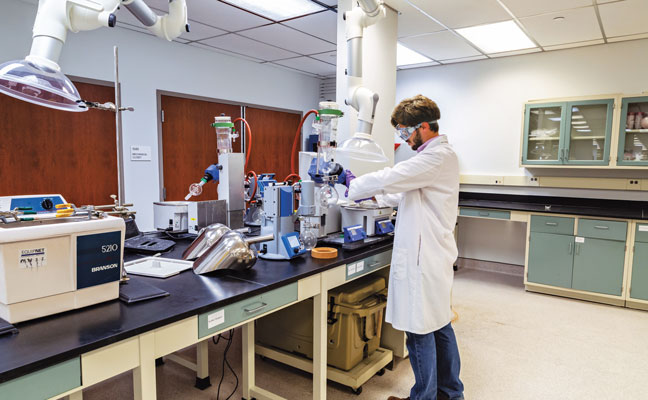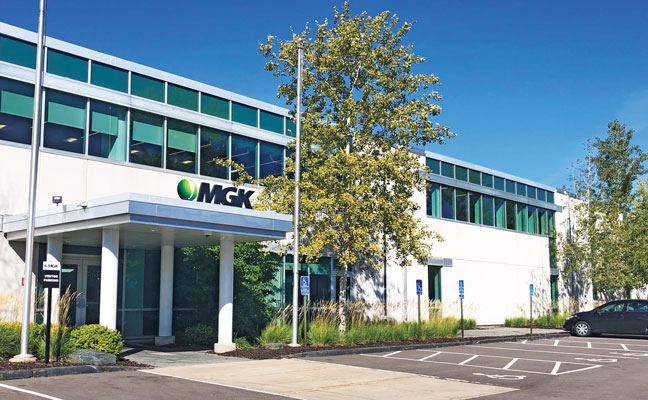
MGK’s new headquarters features a state-of-the-art chem lab. PHOTOS: MGK
Minneapolis, Minn.-based MGK has a history of reinventing itself, and reinvesting in itself.
When founded in 1902, MGK’s principal business was grinding spices, plant leaves, barks, fruits and flowers for use in pharmaceuticals. Early on, MGK discovered its shipments containing certain flowers always seemed to be bug-free. The company had stumbled upon pyrethrum, a botanical insecticide produced primarily in the Dalmatian chrysanthemum (Tanacetum cinerariifolium), also known as the “pyrethrum daisy.” The rest is history: By 1920, MGK was producing pyrethrum-based insecticides for the retail market.
Fast forward to 2001, the year MGK turned 99 years old. The spry company again reinvented itself by expanding beyond retail pest control solutions with the launch of NyGuard, an insect growth regulator (IGR) specially formulated for pest management professionals (PMPs).
“In just 20 years, we’ve gone from zero percent to more than 10 percent market share for general pest control insecticides in the ultra-competitive professional pest management market,” says MGK President Steve Gullickson.
Family-owned for its first 110 years, MGK joined the Sumitomo Chemical Company (SCC) in 2012. Through the alliance, MGK continues to operate autonomously, while gaining access to SCC’s arsenal of active ingredients (AIs), global research and development (R&D) assets, and subsidiaries such as Botanical Resources Australia, which manages acres of daisies used to produce pyrethrum. MGK also continues to be a leading producer of pyrethrum.
Regularly Reinvesting
Over the past decade, MGK has expanded its pipeline, production capabilities and capacities, including:
- Launching CrossFire Bed Bug Concentrate, CrossFire Aerosol, OneGuard Multi MoA Concentrate, and Vendetta Nitro Cockroach Gel Bait.
- Redesigning the CrossFire Bed Bug Concentrate bottle to make measuring and pouring easier and safer, and adding a 13-oz. measuring chamber to save time with single pours.
- Expanding OneGuard’s label to include ants, carpenter bees, cockroaches, flies, scorpions, spiders, wasps and more.
- Relocating its headquarters in December 2019 to Brooklyn Park, Minn., to accommodate growth.
- Moving gel bait production to Brooklyn Park and creating a state-of-the art chem lab there.
- Introducing the Sumari System earlier this year.
MGK also has expanded its staff, adding dozens of teammates in R&D, production, sales and technical service/field support. Its marketing team has grown with the additions of:
- Merris Greiber, senior director of marketing.
- Christine Carey, senior marketing manager.
- Stacy Emond, digital content manager.
- Sara Michael, marketing communications specialist.
All Systems ‘Go’

MGK relocated its headquarters from Golden Valley to Brooklyn Park, Minn., in December 2019. PHOTOS: MGK
MGK has myriad portfolios of products that leverage different AIs, IGRs and modes of action to provide quick-acting and long-lasting pest control, but the control agents typically were not specially formulated from the onset to tag team-targeted pests.
The Sumari System is MGK’s first “system of solutions.” It comprises Sumari Insecticide (launched August 2020) and Sumari Ant Gel Bait (launched March 2021). The two MGK solutions are designed to work in tandem to control ants — homeowners’ No. 1 nuisance pest, and PMPs’ No. 1 time thief and callbacks generator. Editor’s Note: The Sumari brand is a nod to MGK’s parent company: “Sum” is short for Sumitomo; and “ari” means “ants” in Japanese.
The Sumari System takes an “attract-and-kill” approach, reaching deep into ant colonies to deliver quick-acting and long-lasting control through direct contact and ingestion.
⦁ Sumari Insecticide contains two AIs plus MGK’s NyGuard to deliver 90-day residual control. The insecticide is labeled for indoor and outdoor use, including broadcast applications. Sumari Insecticide even knocks out multi-queen ant colonies.
⦁ Sumari Ant Gel Bait features the AI clothianidin and a highly palatable matrix to ensure efficacy even when competing food sources exist. The bait kills colonies within one to two weeks, and is labeled for use outdoors and indoors, including food-handling areas.
“These two Sumari solutions are specifically formulated to work together,” Greiber notes. “The solutions work great on their own, but enhanced performance is achieved when PMPs use the gel bait and concentrate together as the Sumari System.”
“The Sumari System is just the beginning for MGK regarding the development of systems of synergistic solutions,” Gullickson adds. “Each system will target a specific area and leverage multiple solutions formulated to work together to boost PMPs’ efficacy and productivity.
“MGK will specially formulate more systems of solutions to enhance PMPs’ effectiveness in areas such as perimeter control; food-processing, -handling and -storage areas; commercial kitchens; multi-family housing, and more,” Gullickson concludes. “Rarely is there a silver bullet. Usually, a systems approach works best.”
Leave A Comment